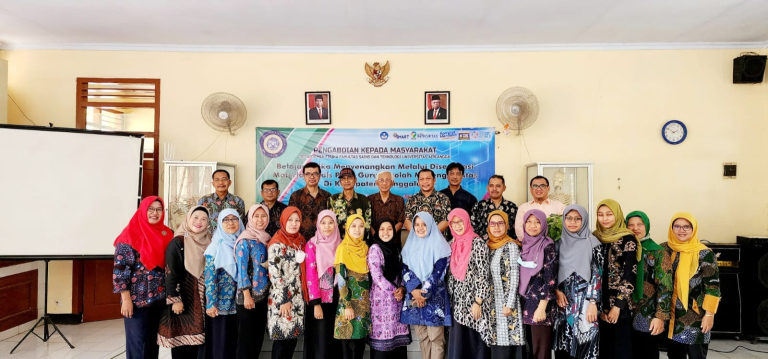
Angga Dito Fauzi
The Department of Physics UNAIR introduces an application of physics to high school students in Kabupaten Trenggalek through the topic of micro-controller usage to regulate the use of clean water in supporting the sixth Sustainable Development Goal, Clean Water and Sanitation.
It is often observed that high school students perceive physics as a collection of formulas and problems that lack practicality. The Department of Physics UNAIR, particularly in the field of instrumentation physics, addresses this perception through a more applied community service (pengmas) topic, namely the ‘Training on Making Smart Wudhu Media to Conserve Clean Water Usage for Students of SMA Negeri 1 Kampak, Kabupaten Trenggalek.’ This pengmas was conducted at SMA Negeri 1 Kampak on September 10, 2022, and attended by teachers and students from around Kabupaten Trenggalek. According to Dr. Imam Sapuan, M.Si., the head of pengmas in the field of instrumentation physics, the activity aims to pique high school students’ interest in physics.
High school students’ perceptions of physics tend to be unfavorable because it is seen as difficult, formulaic, theoretical, abstract, and less applicable to everyday life. Through this training, we hope students will broaden their horizons to see that physics can be applied in all fields and is fascinating because it forms the basis for engineering and other fields. The training focuses on applying physics principles to real-life issues.
For high school students, understanding and addressing everyday life problems is crucial. Hence, the Department of Physics UNAIR conducted this training for teachers and students in Kabupaten Trenggalek. The Department of Physics, Faculty of Science and Technology UNAIR, introduces the ‘Physics is fun’ learning approach in the 2022 pengmas in Trenggalek. This training emphasizes the development of psychomotor skills and creativity in technology development by students. “Students must understand that physics serves as the foundation for the development of nearly all technologies and they will see promising job prospects,” according to Dr. Imam Sapuan, M.Si. This sentiment was echoed by one of the physics professors at UNAIR, Prof. Dr. Retna Apsari, M.Si.
The Chair of the Department of Physics UNAIR, Herri Trilaksana, Ph.D., also emphasizes that solutions to life problems, especially those related to global issues such as the sixth Sustainable Development Goal, Clean Water and Sanitation, need to be considered and anticipated. Proper and efficient use of clean water greatly assists the government in addressing this sixth SDG issue.
The theme of the smart wudhu media was chosen because it is a routine activity performed by Muslims every day; a Muslim is required to perform wudhu at least five times a day, as it is a prerequisite for the five daily prayers. In observing the realities of wudhu practices, the common phenomenon is that the water consumption required for wudhu is often less than the water flowing from the tap. Much clean water is wasted when someone washes their face, hair, nose, and ears, while the tap continues to flow, causing clean water to flow directly into the drainage without being utilized.
In this training, students are encouraged to understand the situation and existing problems and devise solutions to these issues. Critical and strategic thinking are essential skills for students, fostering a problem-solving mindset and boosting their confidence. In this community service topic, students are taught to create smart wudhu media where the principle of operation is to regulate water flow.
Water flows automatically when needed for washing, stops when hands are washing obligatory parts, and ceases after completing wudhu. The opening and closing mechanism of the water flow is controlled through the principle of switching on and off, facilitated by using a micro-controller device that can be learned by high school students as there are plenty of reading materials available on the internet. This activity also serves as an opportunity to enhance digital literacy skills for the younger generation, particularly high school students at SMA Kampak in Kabupaten Trenggalek.
In the same context, Franky Candra, S.T., M.T., one of the instrumentation and micro-controller lecturers at the Department of Physics UNAIR, emphasizes that enhancing digital literacy skills is crucial to introduce and develop among the younger generation due to the rapid technological advancements since the onset of the fourth industrial revolution. Understanding the basics of micro-controllers will indeed be the primary asset for the younger generation to comprehend future technological dynamics they will face, enabling them to compete in future technological competitions.
As a form of strengthening collaboration between the Department of Physics UNAIR and SMA Negeri 1 Kampak and the Kampak district in Kabupaten Trenggalek, the agreement for cooperation with SMA Negeri 1 Kampak as a partner will be expanded into broader activities to address various issues in the Kampak district, Kabupaten Trenggalek. Thus, collaboration and cooperation between the Department of Physics UNAIR and the Kampak district in Kabupaten Trenggalek will continue annually. This initiative also aims to strengthen collaboration between both sides, both the Kampak district and the Department of Physics UNAIR, as emphasized by Herri Trilaksana, Ph.D., the Chair of the Department of Physics UNAIR.
